大学英语综合版学生用书第一单元unit 1
- 格式:doc
- 大小:117.50 KB
- 文档页数:9
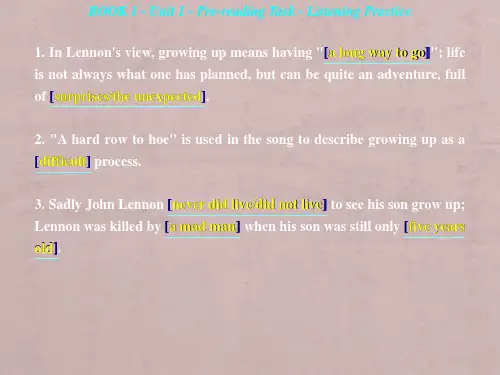
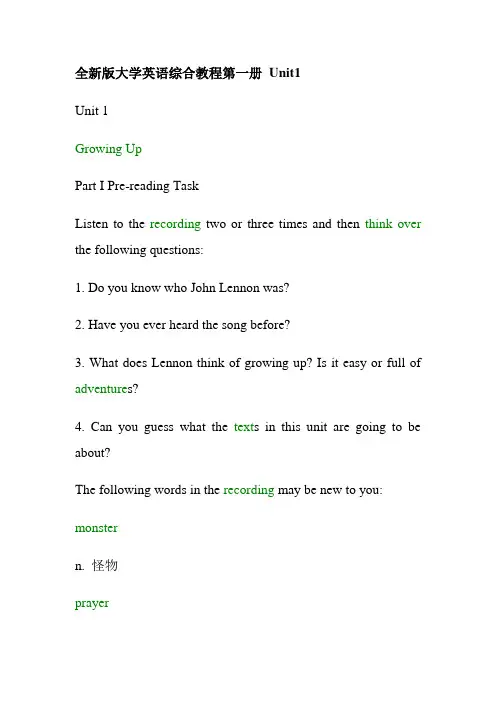
全新版大学英语综合教程第一册Unit1Unit 1Growing UpPart I Pre-reading TaskListen to the recording two or three times and then think over the following questions:1. Do you know who John Lennon was?2. Have you ever heard the song before?3. What does Lennon think of growing up? Is it easy or full of adventure s?4. Can you guess what the text s in this unit are going to be about?The following words in the recording may be new to you:monstern. 怪物prayern. 祈祷Part IIText AWhen we are writing we are often told to keep our readers in mind, to shape what we say to fit their tastes and interests. But there is one reader in particular who should not be forgotten.Can you guess who? surprised himself and everyone else when he discovered the answer.WRITING FOR MYSELFRussell BakerThe idea of becoming a writer had come to me off and on since my childhood in Belleville, but it wasn't until my third year in high school that the possibility took hold. Until then I'd been bored by everything associated with English course s. I found English grammar dull and difficult. I hated the assignments to turn out long, lifeless paragraphs that were agony for teachers to read and for me to write.When our class was assigne d to Mr. Fleagle for third-year English I anticipate d another cheerless year in that most tediousof subjects. Mr. Fleagle had a reputation among students for dullness and inability to inspire. He was said to be very formal, rigid and hopelessly out of date. To me he looked to be sixty or seventy and excessively prim. He wore primly severe eyeglasses, his wavy hair was primly cut and primly comb ed. He wore prim suits with necktie s set primly against the collar button s of his white shirts. He had a primly pointed jaw, a primly straight nose, and a prim manner of speaking that was so correct, so gentlemanly, that he seemed a comic antique.I prepared for an unfruitful year with Mr. Fleagle and for a long time was not disappointed. Late in the year we tackle d the informal essay. Mr. Fleagle distribute d a homework sheet offering us a choice of topic s. None was quite so simple-minded as "What I Did on My Summer Vacation," but most seemed to be almost as dull. I took the list home and did nothing until the night before the essay was due(到期的).Lying on the sofa, I finally faced up to the unwelcome task, took the list out of my notebook, and scan ned it. The topic on which my eye stopped was "The Art of Eating Spaghetti."This title produced an extraordinary sequence of mental image s.in Bellevillewhen all of us were seated around the supper table —Uncle Allen, my mother, Uncle Charlie, Doris, Uncle Hal — and Aunt Pat serve d spaghetti for supper. Spaghetti was still a little known foreign dish in those days. Neither Doris nor I had ever eaten spaghetti, and none of the adults had enough experience to be good at it. All the good humor of Uncle Allen's house reawoke in my mind as I recall ed the laughing argument s we had that night about the socially respectable method for moving spaghetti from plate to mouth.Suddenly I wanted to write about that, about the warmth and good feeling of it, but I wanted to put it down simply for my own joy, not for Mr. Fleagle. It was a moment I wanted to recapture and hold for myself. I wanted to relive the pleasure of that evening. To write it as I wanted, however, would violate all the rules of formal composition I'd learned in school, and Mr. Fleagle would surely give it a failing grade. Never mind. I would write something else for Mr. Fleagle after I had written this thing for myself.When I finished it the night was half gone and there was no time left to compose a proper, respectable essay for Mr. Fleagle. There was no choice next morning but to turn in my tale of theBelleville supper. Two days passed before Mr. Fleagle returned the graded papers, and he returned everyone's but mine. I was preparing myself for a command to report to Mr. Fleagle immediately after school for discipline when I saw him lift my paper from his desk and knock for the class's attention."Now, boys," he said. "I want to read you an essay. This is titled, 'The Art of Eating Spaghetti.'"And he started to read. My words! He was reading my words out loud to the entire class. What's more, the entire class was listening. Listening attentively. Then somebody laughed, then the entire class was laughing, and not in contempt and ridicule, but with open-hearted enjoyment. Even Mr. Fleagle stopped two or three times to hold back a small prim smile.I did my best to avoid show ing pleasure, but what I was feeling was pure delight at this demonstration that my words had the power to make people laugh. In the eleventh grade, at the eleventh hour as it were, I had discovered a calling. It was the happiest moment of my entire school career. When Mr. Fleagle finished he put the final seal on my happiness by saying, "Now that(连用有既然之意,但此处非连用), boys, is an essay, don'tyou see. It's — don't you see —Congratulation s, Mr. Baker."(797 words)New Words and Expressionsoff and onfrom time to time; sometimes 断断续续地;有时possibilityn. 可能(性)take holdbecome established生根,确立borevt. make (sb.) become tired and lose interest 使(人)厌烦associatevt. join or connect together; bring in the mind 使联系起来;使联想assignmentn. a piece of work that is given to a particular person(分配的)工作,任务,作业turn outproduce 编写;生产,制造agony▲n. very great pain or suffering of mind or body (身心的)极度痛苦assignvt. give as a share or duty 分配,分派anticipatevt. expect 预期,期望tediousa. boring and lasting for a long time 乏味的;冗长的reputationn. 名声;名誉inabilityn. lack of power, skill or ability 无能,无力inspirevt. fill (sb.) with confidence, eagerness, etc. 激励,鼓舞formala. (too) serious and careful in manner and behavior; based on correct or accepted rules 刻板的,拘谨的;正式的,正规的rigida. (often disapproving) fixed in behavior, view s or method s; strict 一成不变的;严格的hopelesslyad. very much; without hope 十分,极度;绝望地excessivelyad. 过分地out of dateold-fashioned过时的prima. (usu. disapproving) (of a person) too formal or correct in behavior and showing a dislike of anything rude; neat古板的,拘谨的;循规蹈矩的;整洁的primly ad.severea. completely plain; causing very great pain, difficulty, worry, etc. 朴素的;严重的,剧烈的necktien. tie 领带jawn. 颌,颚comic▲a. 滑稽的;喜剧的n. 连环漫画(册)antiquen. 古物,古玩tacklevt. try to deal with 处理,应付essayn. 散文,小品文;论说文distributevt. divide and give out among people, places, etc. 分发,分配,分送finallyad. at last 最终,终于face up tobe brave enough to accept or deal with 勇敢地接受或对付scanv. look through quickly 浏览,粗略地看spaghettin. 意大利式细面条titlen. a name given to a book, film, etc. 标题,题目vt. give a name to 给…加标题,加题目于extraordinarya. very unusual or strange 不同寻常的;奇特的sequencen. 一连串相关的事物;次序,顺序imagen. a picture formed in the mind 形象;印象;(图)像adultn. a fully grown person or animal 成年人;成年动物humorn. 心情;幽默,诙谐recallvt. bring back to the mind; remember 回想起,回忆起argumentn. 论据,论点;争论respectablea. (of behavior, appearance, etc.) socially acceptable可敬的;体面的;文雅的put downwrite down 写下recapturevt. (lit) bring back into the mind; experience again 再现;再次经历relivevt. experience again, esp. in one's imagination再体验,重温violatevt. act against 违背,违反composevt. write or create (music, poetry, etc.) 创作turn inhand in (work that one has done) 交(作业)commandn.,v.命令,指令disciplinen. punishment; order kept (among school-children, soldiers, etc.) 惩罚,处分;纪律what's morein addition, more importantly 而且,此外;更有甚者contempt▲n. 轻视,轻蔑ridiculen. making or being made fun of 嘲笑,嘲弄;被戏弄open-hearteda. sincere, frank诚挚的hold backprevent the expression of (feelings, tears, etc.) 控制(感情、眼泪等)avoidvt. keep or get away from 避免demonstrationn. act of showing or proving sth. 表明;证明careern. 生涯,事业;职业sealn. 印,图章essence▲n. the most important quality of a thing 本质;精髓congratulationn. (usu. pl) expression of joy for sb.'s success, luck, etc. 祝贺,恭喜Proper NamesRussell Baker拉赛尔·贝克Belleville贝尔维尔(美国地名)Fleagle弗利格尔(姓氏)Allen艾伦(男子名)Charlie查理(男子名)Doris多丽丝(女子名)Hal哈尔(男子名,Henry, Harold的昵称)Pat帕特(女子名,Patricia的昵称)。
![新标准大学英语综合教程1(unit1-unit6课文翻译)[整理版]](https://uimg.taocdn.com/4e429f09a66e58fafab069dc5022aaea998f4180.webp)
UNIT 1大一新生日记星期日从家里出发后,我们开车开了很长一段时间才到达我住的宿舍楼。
我进去登记。
宿舍管理员给了我一串钥匙,并告诉了我房间号。
我的房间在6楼,可电梯坏了。
等我们终于找到8号房的时候,妈妈已经涨红了脸,上气不接下气。
我打开门锁,我们都走了进去。
但爸爸马上就从里面钻了出来。
这个房间刚刚够一个人住,一家人都进去,肯定装不下。
我躺在床上,不动弹就可以碰到三面墙。
幸亏我哥哥和我的狗没一起来。
后来,爸爸妈妈就走了,只剩下我孤零零一个人。
周围只有书和一个箱子。
接下来我该做什么?星期一早上,有一个为一年级新生举办的咖啡早茶会。
我见到了我的导师,他个子高高的,肩膀厚实,好像打定了主意要逗人开心。
“你是从很远的地方来的吗?”他问我。
他边说话边晃悠脑袋,咖啡都洒到杯托里了。
“我家离爱丁堡不太远,开车大约6个小时,”我说。
“好极了!”他说,接着又走向站在我旁边的那个女孩儿。
“你是从很远的地方来的吗?”他问。
但不等那女孩儿作出任何回答,他就说到,“好极了!”然后就继续向前走。
他啜了一口咖啡,却惊讶地发现杯子是空的。
妈妈打来电话。
她问我是不是见到了导师。
星期二我觉得有点儿饿,这才意识到我已经两天没吃东西了。
我下楼去,得知一天三餐我可以在餐厅里吃。
我下到餐厅排进了长队。
“早餐吃什么?”我问前面的男生。
“不知道。
我来得太晚了,吃不上早餐了。
这是午餐。
”午餐是自助餐,今天的菜谱是鸡肉、米饭、土豆、沙拉、蔬菜、奶酪、酸奶和水果。
前面的男生每样儿都取一些放到托盘上,付了钱,坐下来吃。
我再也不觉得饿了。
妈妈打电话来。
她问我有没有好好吃饭。
星期三早上9点钟我要去听一个讲座。
我醒时已经8:45了。
竟然没有人叫我起床。
奇怪。
我穿好衣服,急匆匆地赶到大讲堂。
我在一个睡眼惺忪的女生旁边坐下。
她看了看我,问:“刚起床?”她是怎么看出来的?讲座进行了1个小时。
结束时我看了看笔记,我根本就看不懂自己写的字。
那个女生名叫苏菲,和我一样,也是英语文学专业的学生。
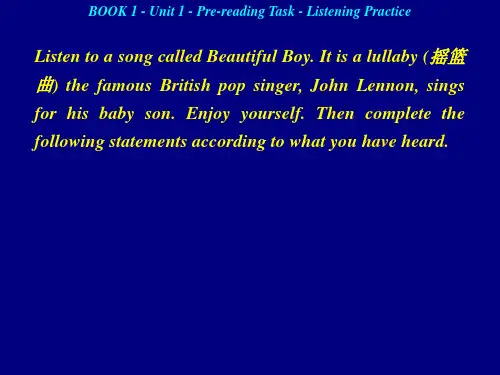
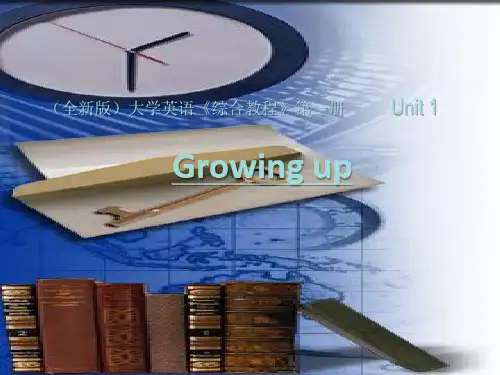
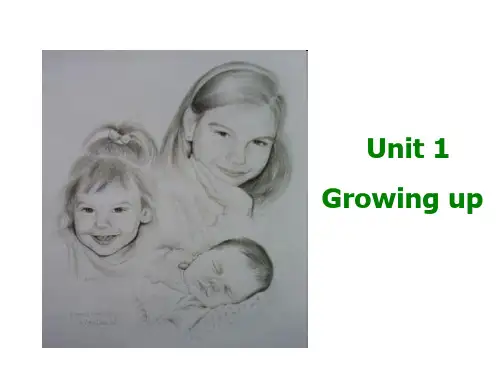
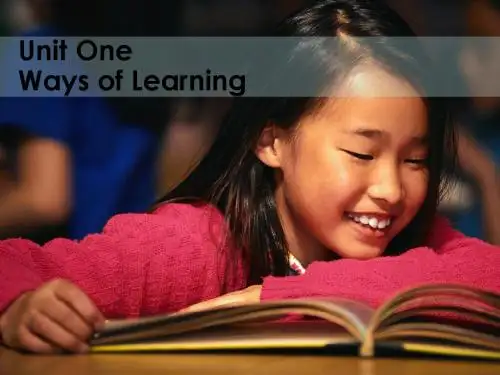
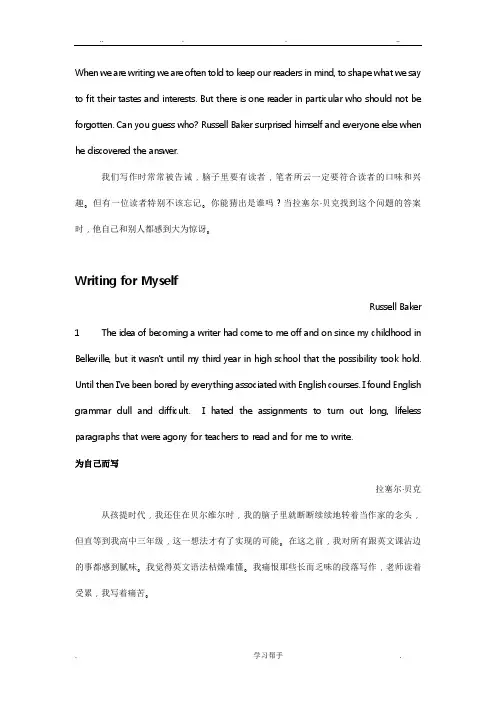
When we are writing we are often told to keep our readers in mind, to shape what we say to fit their tastes and interests. But there is one reader in particular who should not be forgotten. Can you guess who? Russell Baker surprised himself and everyone else when he discovered the answer.我们写作时常常被告诫,脑子里要有读者,笔者所云一定要符合读者的口味和兴趣。
但有一位读者特别不该忘记。
你能猜出是谁吗?当拉塞尔·贝克找到这个问题的答案时,他自己和别人都感到大为惊讶。
Writing for MyselfRussell Baker 1 The idea of becoming a writer had come to me off and on since my childhood in Belleville, but it wasn't until my third year in high school that the possibility took hold. Until then I've been bored by everything associated with English courses. I found English grammar dull and difficult. I hated the assignments to turn out long, lifeless paragraphs that were agony for teachers to read and for me to write.为自己而写拉塞尔·贝克从孩提时代,我还住在贝尔维尔时,我的脑子里就断断续续地转着当作家的念头,但直等到我高中三年级,这一想法才有了实现的可能。
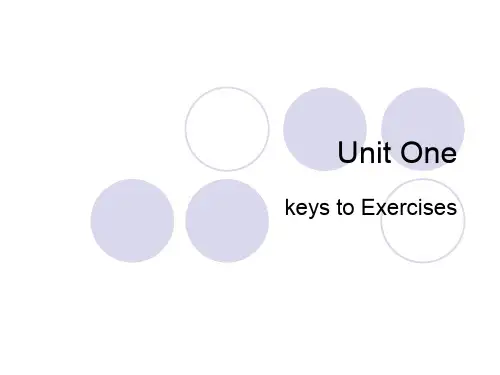
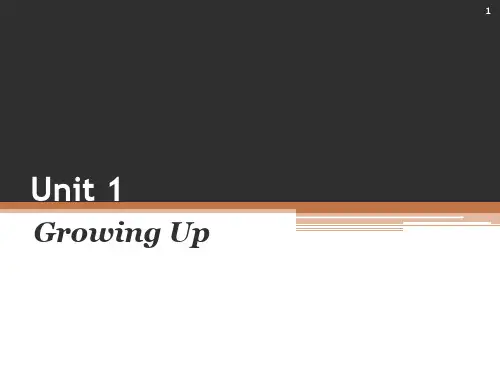

全新版大学英语综合教程1unit1作文Unit 1 of the new version of College English Integrated Course 1 focuses on introducing oneself and making simple conversation in English. In this unit, students will learn how to talk about personal information, hobbies, study habits, and future plans. Through various exercises and activities, students will be able to improve their listening, speaking, reading, and writing skills.One of the key topics covered in Unit 1 is introducing oneself in English. Students will learn how to say their name, age, nationality, occupation, and hobbies. They will also practice asking and answering questions about these topics. By the end of the unit, students should be able to confidently introduce themselves in English in different social settings.Another important aspect of Unit 1 is making simple conversations in English. Students will be introduced to basic greetings, expressions of courtesy, and conversation starters. They will practice talking about their daily routines, preferences, and plans for the future. Through role-playing activities and group discussions, students will develop their ability to communicate effectively in English.In addition to language skills, Unit 1 also focuses on building students' confidence and motivation to learn English. By setting achievable goals, providing positive reinforcement, and fostering a supportive learning environment, teachers can help students overcome their fears and doubts about learning a new language.Overall, Unit 1 of the new version of College English Integrated Course 1 provides students with a solid foundation in basic English communication skills. By mastering the content of this unit, students will be well equipped to continue their English learning journey and expand their language abilities in the future.。
Unit11)那是个正规宴会,我照妈妈对我讲的那样穿着礼服去了。
As it was a formal dinner party ,I wore formal dress ,as Mother told me to.2)他的女友劝他趁抽烟的坏习惯沿未根深蒂固之前把它改掉。
His girlfriend advised him to get rid of his bad habit of smoking before it took hold.3)他们预料到下几个月电的需求量很大,决定增加生产。
Anticipating that the demand for electricity will be high during the next few months,they have decided to increase its production.4)据说比尔因一再违反公司的安全规章而被解雇。
It is said that Bill has been fired for continually violating the company’s safety rules.5)据报道地方政府己采取适当措施避免严重缺水。
It is reported that government has taken proper measures to avoid the possibility of a severe water shortage.Unit21)半个小时过去了,但末班车还没来。
我们只好走回家。
Half an hour had gone by ,but the last bus had not come yet.We had to walk home.2)玛丽看上去对汉语考试很担心,因为她还没有背熟课文。
Mary looks as if she is very worried about the Chinese exam because she hasn’t learned the texts by heart.3)既然篮球赛己被推迟,我们不妨去参观博物馆。
全新版大学英语综合教程1课后答案「第一单元」全新版大学英语综合教程1课后答案「第一单元」全新版大学英语综合教程每单元围绕一个反映当代生活实际的.主题展开,指导学生对该现实主题充分进行语言综合应用能力、特别是听说能力的培养和训练。
下面是店铺分享的全新版大学英语综合教程,欢迎大家阅读!Unit 1 Growing UpPart II Language FocusVocabularyⅠ.1、respectable2、agony3、put…down4、sequence5、hold back6、distribute7、off and on8、vivid9、associate10、finally11、turn in12、tackle1、has been assigned to the newspaper’s Paris office.2、was so extraordinary that I didn’t know whether to believe him or not.3、a clear image of how she would look in twenty years’ time.4、gave the command the soldiers opened fire.5、buying bikes we’ll keep turning them out.1、reputation, rigid, to inspire2、and tedious, What’s more, out of date ideas3、compose, career, avoid showing, hardly hold back Ⅱ.1、composed2、severe3、agony4、extraordinary5、recall6、command7、was violating8、anticipateⅢ.1、at2、for3、of4、with。
Title: Embracing Change: A Journey ofGrowth and DiscoveryIn the fast-paced world of today, change is inevitable. It is a constant force that shapes our lives, pushing us to adapt and evolve. The unit one of the New Edition of College English Integrated Coursebook, which focuses on the theme of change, resonates deeply with this idea. It encourages us to embrace change, to see it as an opportunity for growth and discovery, rather than a threat to our stability.Change can be both exciting and daunting. It brings new experiences, new challenges, and often, new opportunities. However, it also requires us to let go of the familiar, to step into the unknown. This can be difficult, as it involves a leap of faith and a willingness to take risks. Yet, it is this willingness to embrace change that defines our growth as individuals. As we navigate through the twists and turns of life, we learn to be resilient, to adapt to new situations, and to find strength within ourselves. We discover that change is not something to be feared, but rather, something to be celebrated.The unit one of the textbook explores this idea through a variety of texts and activities. It introduces us to characters who have faced significant changes in theirlives and have emerged stronger and wiser. Their stories inspire us to view change as a positive force that can transform our lives.Moreover, the unit encourages us to reflect on our own experiences of change. It prompts us to consider how we have responded to changes in our lives, whether we have embraced them or resisted them, and what we have learned from these experiences. This reflection is crucial in helping us understand our own growth and development.In conclusion, the unit one of the New Edition of College English Integrated Coursebook is a powerful reminder of the importance of embracing change. It teaches us that change is not only inevitable but also essentialfor our growth and discovery. As we continue to navigate through the changing landscapes of our lives, let us remember to embrace each new challenge, to learn from each new experience, and to find strength and wisdom in the process.**拥抱变化:成长与发现的旅程**在当今快节奏的世界中,变化是不可避免的。
Unit 1 Ways of Learning1. Education in the WestMuch of the current debate over education surrounds the extent to which learning should be teacher-based or student-based. Which of the two should decide what should be learned, how itshould be learned, and when it should be learned? Comparing Western and Asian methods oflearning it is generally true that Western methods are more student-centered, expecting students to discover things for themselves rather than relying on their teachers to tell them. An extreme version of the student-centered approach can be seen at Summerhill, a school in England established by the educationalist A. S. Neill. There children have complete freedom to decide what they are going tolearn and which lessons they will attend. If they wish they need not attend any at all. Mainstreameducation in England is far more strict, demanding that children attend lessons and follow a national curriculum. This curriculum and the importance of achieving good exam results tend to reinforce amore teacher-centered approach, as both teachers and students find the pressure of time leaves less opportunity for an exploratory approach to learning.Detailed ReadingⅠ. Difficult Sentences1. (LL. 100~102) Can we gather, from the Chinese and American extremes, a superior way to approacheducation, perhaps striking a better balance between the poles of creativity and basic skills?1. Translate the sentence into Chinese.(=我们能否从中美两个极端中寻求一种更好的教育方式,它或许能在创造力与基本技能这两极之间获得某种较好的平衡?)2. Do you think that we can find a better way to approach education, which strikes a better balancebetween the poles of creativity and basic skills?Ⅱ. Words and Expressions1. (L. 25) on occasion: now and then* It has, on occasion, created trouble for the bank.你有时使人们感到诧异。
(=You have on occasion surprised people.)CF: on occasion & on the occasion of这两个词组非常相似,但意思不同。
on occasion有时,间或。
on the occasion of在… 之际。
* on the occasion of sb.'s wedding2. (L. 26) neglect: vt. give too little attention or care to* neglect one's meals and sleep离开时别忘了锁门。
(=Don't neglect to lock the door when you leave.)CF: neglect, ignore & omit这几个词都有忽略、遗漏之意。
neglect 指对职责、义务或应做的事没有给予足够的注意。
这种忘记可能是有意的,也可能是无意的。
例如:*Those who neglect their duties should be punished. 玩忽职守者应受惩罚。
*Why do they always neglect the traffic regulation. 他们为什么老是不注意遵守交通规则呢?ignore 指疏忽、不顾,强调对某人或某物故意不理会,有时还带有固执地拒绝的意味。
例如:*When I saw Tom, I stopped to greet him, but he ignored me and walked on. 当我看到汤姆时,我停下来和他打招呼,但他没有理我继续往前走。
*The teacher ignored my difficult questions. 老师对我的难题置之不理。
omit 指因专注或疏忽而忘记某事,这种失误可能是有意或无意的。
该词还可指删除不利或不必要的东西。
例如:*She should not omit to visit the museum. 她不应忘了去参观博物馆。
*The third part of the book may be omitted. 该书的第三部分可以删掉。
3.(L. 29 ) investigate:1. vt. try to find out information about* Scientists are investigating how the plane crash occurred.* If you hear such a rumor, investigate it thoroughly.2. vi. make a detailed inquiry*investigate into an affair*investigate into a rumorCF: investigate, examine & inspect这几个词都有调查、检查之意。
investigate 较正式,指有条不紊地进行调查研究以发现事实真相,更常用以说明调查案件、情况、背景来历等。
例如:*They investigated the cause of the accident. 他们调查了事故的原因。
*The police are investigating the murder. 警方正在调查这件谋杀案。
examine 是普通用语,指仔细地检查某人或物。
该词还指官方主持的检查或医生进行的诊察,也表示对某种观点的讨论研究,更指考试。
例如:*They examined our passports very carefully. 他们仔细检查了我们的护照。
*An optician is qualified to examine your eyes and prescribe glasses. 眼科医生有资格来检查你的眼睛并给你配眼镜。
inspect 较正式,用得不如examine广泛,指对某人或某物进行检查、查问,带有揭示其差异或缺陷的意思。
更常指官员们的视察以发现下属单位的缺点等,还指检阅军队。
例如:*The firemen were inspecting the warehouse for potential fire hazards. 消防人员正在检查仓库以防火灾。
*Every length of cloth is inspected before it leaves the factory. 出厂之前每寸布匹都检查过。
4. (L. 30) throw light on: help understanding* These facts throw new light on the matter.这些事实使人进一步了解此事。
5. (L. 34) exception: n. sb./sth. that a comment or statement does not apply to(=There is an exception to this grammatical rule.)这是那项规定的一个明显的例外。
(= This is an apparent exception to the rule.)Pattern: an exception toCollocation:with many/few exceptions 有很多/很少例外without exception 毫无例外,一律with the exception of 除…之外make an exception of 把...作为例外make no exceptions 不容许有例外;一视同仁6. (L. 41) accomplish: vt. manage to do (sth.)* She's accomplished a great deal in the last few weeks.这项任务不是在一代人的时间里所能完成的。
(= The task will not be accomplished in one generation.)Collocation:accomplish one's object/goal 达到目的accomplish one's mission 完成使命CF: accomplish, complete & finish这三个词都含“完成”的意思。